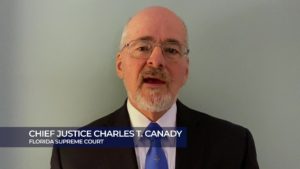Canady: Lessons from the pandemic will benefit the legal system in the long run
 Florida judges and lawyers have worked diligently to respond to a lethal pandemic, and COVID-19 has taught valuable lessons that will transform the administration of justice, according to Chief Justice Charles Canady.
Florida judges and lawyers have worked diligently to respond to a lethal pandemic, and COVID-19 has taught valuable lessons that will transform the administration of justice, according to Chief Justice Charles Canady.
Addressing the General Assembly of The Florida Bar’s Annual Convention via a video-taped message, Justice Canady thanked outgoing President John Stewart for his “outstanding leadership” during the crisis.
“John, all of the members of our profession owe you a debt of gratitude for the leadership you have demonstrated during your year as president — and especially during the current crisis,” he said.
Since the suspension of jury trials on March 13, judges and their staffs have labored to keep the justice system from coming to a “grinding halt,” the chief justice said. “Judges throughout Florida are working hard to carry on judicial business to the maximum extent possible given the constraints imposed by the pandemic,” he said. “I’m grateful to the judges — county, circuit, and district judges — who in the face of the pandemic continue to provide justice for the people of Florida.”
The judges are united by a single goal, Justice Canady said.
“We all understand that the protection of the liberty and the prosperity of our people depends on a healthy, functioning court system,” Canady said. “And that the goal of equal justice for everyone — which would be meaningless without courts and lawyers — is at the very heart of our constitution and the promise of America.”
Chief judges especially deserve praise for their “energetic leadership” and for rapidly adapting to the circumstances, the chief justice said.
“The operational challenges have been manifold, and the chief judges have managed those challenges day in and day out to keep the wheels of justice moving,” he said. “In the midst of the pandemic, the people of Florida have been well served by our chief judges.”
The judges’ success wouldn’t be possible, the chief justice said, without the “special effort” of court staff, led by Office of State Courts Administrator Lisa Kiel.
“Lisa and her team have worked ceaselessly throughout the pandemic,” he said. “And they have done so cheerfully and with great professionalism.”
Court staff, in turn, have been aided by their “justice system partners,” the chief justice said.
“The clerks, the counties, the sheriffs, the state attorneys, the public defenders, and all the lawyers who come before our courts — all these play an essential role in the work of justice,” he said. “I’m very grateful for the work that everyone has done to move forward in the face of the pandemic.”
The courts will move forward, but cautiously, in the face of a lethal virus that scientists are still struggling to understand, the chief justice said.
“That uncertainty cannot be allowed to immobilize us, but it does require that we proceed thoughtfully, deliberately, always willing to reexamine our preconceptions, and with an awareness that everything we are doing in response to the pandemic is a work in progress,” he said.
One of those works in progress, the chief justice said, is a voluntary pilot program in five judicial circuits that permits the use of remote technology for civil jury trials. The court system won’t be fully functional until jury trials are fully restored, Justice Canady said, and the courts are “moving deliberately — but not precipitously — toward that restoration.”
“All the participants in the jury trial process — many of whom are compelled to be there — must have confidence that we understand the critical importance of protecting their health,” he said. “Meeting that condition is essential if the resumption of jury trials will be successful.”
Criminal jury trials will take priority when jury trials resume, he added.
The pandemic has made judges and lawyers more proficient with remote technology, including videoconferencing, Justice Canady said.
“We have learned a great deal from this experience that will benefit the court system long after we are beyond the constraints imposed by the pandemic,” he said. “I believe that in future years when we look back on this difficult time we will see that seeds were planted that helped our courts become more efficient and responsive.”
And to that end, the “Workgroup on the Continuity of Court Operations, under the outstanding leadership of Judge Lisa Munyon,” deserves special praise for helping the courts move “though this uncertain terrain,” the chief justice said.
“They have put aside their other obligations and have devoted untold hours to the issues dealt with by the workgroup,” he said. “I am so grateful to them for everything they have done to help us chart the course forward for our branch.”
While state economists predict that the state budget faces steep cuts, the chief justice said he is “encouraged by the expression of support” he has received from lawmakers throughout the state.
“As our courts go forward. . . the support of the legal profession for adequate funding for the judicial branch will be more important than ever,” he said. “There are certainly great challenges ahead of us, but I’m confident that we will be able to meet those challenges.”
Chief Justice Canady said he looked forward to working with incoming President Dori Foster-Morales and President-elect Michael Tanner, whom he predicted “will do an outstanding job for the lawyers of Florida.”
“As chief justice, I now say to all the lawyers and judges in Florida — and to all those who help us in our work — thank you for giving life to the rule of law and for pursuing the goal of equal justice for all.”














